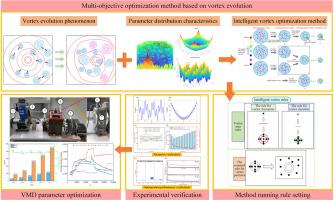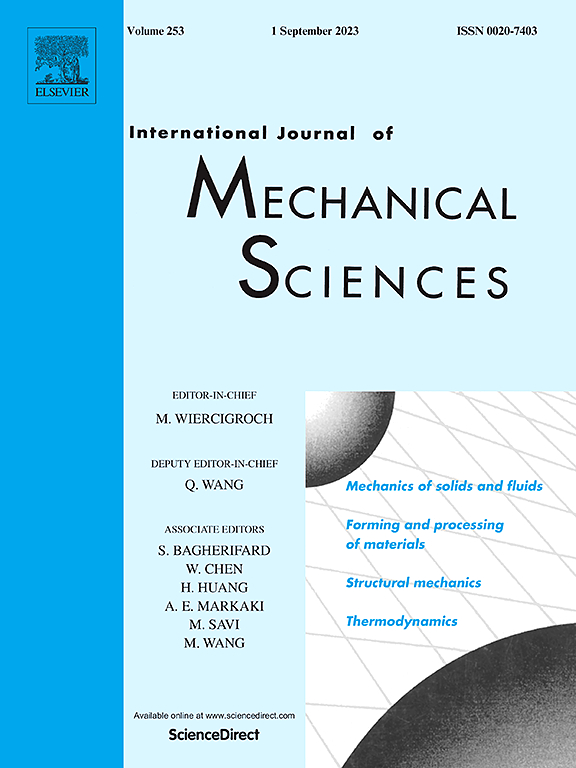Intelligent vortex optimization method for multi-objective VMD in mechanical fault diagnosis
IF 9.4
1区 工程技术
Q1 ENGINEERING, MECHANICAL
International Journal of Mechanical Sciences
Pub Date : 2025-09-18
DOI:10.1016/j.ijmecsci.2025.110860
引用次数: 0
Abstract
In mechanical system fault signal processing, variational mode decomposition (VMD) is highly sensitive to the selection of the number of intrinsic mode functions and the penalty factor. An inappropriate parameter combination can markedly weaken the decomposition performance and reduce the accuracy of fault diagnosis. To address the limitations of existing approaches in terms of both accuracy and efficiency, this study, inspired by vortex evolution phenomena in nature, proposes a new meta-heuristic (MH) optimization algorithm that integrates a vortex iteration mechanism with parameter distribution characteristics—termed intelligent vortex optimization (IVO) method. IVO method, based on the golden section rule, can rapidly focus on the extremum area, thereby enhancing local convergence performance. By deconstructing low-quality vortices, it strengthens global exploration capability and achieves an effective balance between exploitation and exploration in the search space. Meanwhile, the mutated particles in each generation are able to explore unknown areas, thus avoiding entrapment in local optima. A comparison with the optimization results of the genetic algorithm (GA) demonstrates that IVO outperforms in both accuracy and efficiency, while also exhibiting strong robustness. Furthermore, the IVO method was successfully applied to the VMD parameter optimization task for fault signals in mechanical systems. Experimental results demonstrate that, while ensuring decomposition accuracy, the computational efficiency was improved by 76.27 %. The IVO method expands the optimization perspective of MH methods and provides an efficient solution for addressing multi-objective optimization problems.

机械故障诊断中多目标VMD的智能涡优化方法
在机械系统故障信号处理中,变分模态分解(VMD)对固有模态函数个数和惩罚因子的选择高度敏感。不适当的参数组合会显著削弱分解性能,降低故障诊断的准确性。为了解决现有方法在精度和效率方面的局限性,本研究在自然界涡旋演化现象的启发下,提出了一种新的元启发式(meta-heuristic, MH)优化算法,该算法将涡旋迭代机制与参数分布特征相结合,称为智能涡旋优化(intelligent vortex optimization, IVO)方法。基于黄金分割规则的IVO方法可以快速聚焦到极值区域,从而提高了局部收敛性能。通过解构低质量涡,增强了全局搜索能力,在搜索空间中实现了利用与探索的有效平衡。同时,每一代的突变粒子都能够探索未知区域,从而避免陷入局部最优。与遗传算法(GA)的优化结果比较表明,IVO算法在精度和效率上都优于遗传算法,同时具有较强的鲁棒性。将该方法成功地应用于机械系统故障信号的VMD参数优化任务中。实验结果表明,在保证分解精度的同时,计算效率提高了76.27%。IVO方法拓展了MH方法的优化视角,为解决多目标优化问题提供了一种有效的解决方案。
本文章由计算机程序翻译,如有差异,请以英文原文为准。
求助全文
约1分钟内获得全文
求助全文
来源期刊

International Journal of Mechanical Sciences
工程技术-工程:机械
CiteScore
12.80
自引率
17.80%
发文量
769
审稿时长
19 days
期刊介绍:
The International Journal of Mechanical Sciences (IJMS) serves as a global platform for the publication and dissemination of original research that contributes to a deeper scientific understanding of the fundamental disciplines within mechanical, civil, and material engineering.
The primary focus of IJMS is to showcase innovative and ground-breaking work that utilizes analytical and computational modeling techniques, such as Finite Element Method (FEM), Boundary Element Method (BEM), and mesh-free methods, among others. These modeling methods are applied to diverse fields including rigid-body mechanics (e.g., dynamics, vibration, stability), structural mechanics, metal forming, advanced materials (e.g., metals, composites, cellular, smart) behavior and applications, impact mechanics, strain localization, and other nonlinear effects (e.g., large deflections, plasticity, fracture).
Additionally, IJMS covers the realms of fluid mechanics (both external and internal flows), tribology, thermodynamics, and materials processing. These subjects collectively form the core of the journal's content.
In summary, IJMS provides a prestigious platform for researchers to present their original contributions, shedding light on analytical and computational modeling methods in various areas of mechanical engineering, as well as exploring the behavior and application of advanced materials, fluid mechanics, thermodynamics, and materials processing.
 求助内容:
求助内容: 应助结果提醒方式:
应助结果提醒方式:


